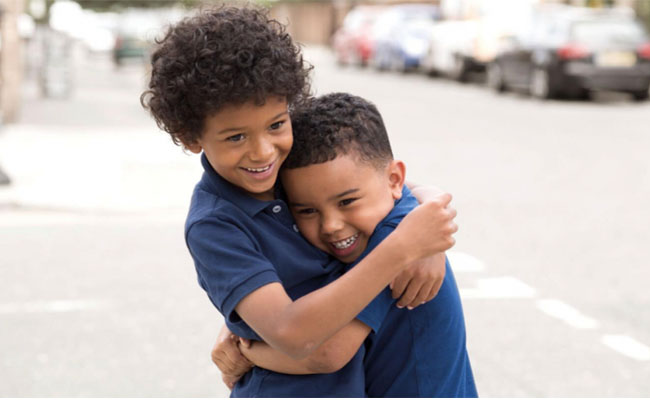Helpline provides therapeutic support, a live web chat facility, and a lifeline to communities struggling to deal with issues such as sickness and bereavement, rising hate crime and loss of support services
Asian and Black children and families, who have been hit hardest by COVID-19, could experience increased challenges to their emotional health and wellbeing, as England enters a four-week lockdown on Thursday.
The new restrictions, combined with the existing lockdown measures for Scotland, Wales and Northern Ireland, are likely to further worsen the UK’s economic downturn and people’s anxieties – so Barnardo’s has stepped in to provide a new support helpline specifically for these communities.
Barnardo’s, the UK’s largest children’s charity, has launched Boloh, the first helpline specifically supporting vulnerable Black, Asian and minority ethnic children and families negatively affected by COVID-19.
The helpline provides therapeutic support, a live web chat facility, and a lifeline to communities struggling to deal with issues such as sickness and bereavement, rising hate crime and loss of support services, due to the pandemic, on top of existing inequalities, including poverty, overcrowded housing and physical and mental health problems.
The Boloh service also provides advice, and support from trained specialist advisors and therapists – who are from a diverse set of cultural backgrounds and aim to speak a range of languages. The helpline will also signpost queries to a range of different organisations such as Citizen Advice, which can help with families experiencing financial problems, and also to local community groups. Boloh is a word used in many languages including Hindi, Urdu and Gujarati, meaning ‘speak’ or to be invited to speak.
Barnardo’s knows from its ‘See, Hear, Respond’, therapeutic support service in England funded by the Department of Education, that Black, Asian and minority ethnic children have suffered increasing levels of trauma, and are afraid for their futures, their families and communities due to the pandemic.
Three quarters of these children, young people and families reported an increase in discrimination and hate crime within schools and communities, while mental health, isolation and loneliness, and barriers back into education were the main reasons for contacting the service.
Research published last week by the Resolution Foundation shows Black, Asian and minority ethnic workers are more likely to be made unemployed post-furlough.
A survey of 6,000 adults found over one in five of Black, Asian and minority ethnic workers who were furloughed during lockdown were unemployed in September, compared to 9% for the general population.
Recent research by the Financial Conduct Authority (FCA) also shows around 12 million people in Britain are likely to struggle with bills or loan repayments amid the continued economic disruption triggered by the coronavirus pandemic. Those from Black, Asian and minority ethnic backgrounds are most likely to be affected, with 37% within this group taking a financial hit to their income.
Meanwhile, official statistics show Black people are around four times more likely to die from COVID-19 related illnesses than white people of the same age. And nearly double the number of children from Asian and Balck families are in poverty compared with white children.
These children are 1.5 times more likely to be young carers, with little access to support over the last six months, leaving many to fall behind at school, as they stay at home to look after and protect loved ones from the virus.
Barnardo’s new Boloh helpline, launched on 1 October, is the result of a new partnership with the National Emergencies Trust, (NET) whose funds are ring-fenced to target specific at-risk groups across the UK. The £900,000 grant will be drawn from £20 million pledged to the Coronavirus Appeal by the COVID-19 Support Fund, established by the insurance and long-term savings industry. The Fund aims to support those hardest-hit by COVID-19, including families and children living in poverty.
Barnardo’s CEO, Javed Khan, said: “As thousands of vulnerable children and families across the UK bear the brunt of the COVID-19 crisis, the urgent need for specialist advice and support has never been greater.
“I know from personal experience that families in Black, Asian, and minority ethnic communities have been hit hardest by the pandemic. Black people are four times more likely to die of the virus compared to white people, while COVID and recession are worsening existing inequalities. As a result, children are suffering bereavement, mental health problems and fear for the future – yet many remain hidden from essential support services and have been left to suffer in silence.
“Our new helpline for children and families is the first of its kind, offering a UK-wide support service to help these families tackle a unique and complex range of issues.
“Barnardo’s is proud to be at the forefront of responding to the challenges faced by vulnerable children and young people. In these uniquely challenging times we are working in partnership with Government, business and other charities to support those who need us most.”
Barnardo’s knows from its ‘See, Hear, Respond’ service, a therapeutic support service in England funded by the Department of Education, that Black, Asian and minority ethnic children have suffered increasing levels of trauma, and are afraid for their futures, their families and communities due to the pandemic.
Three quarters of these children, young people and families reported an increase in discrimination and hate crime within schools and communities, while mental health, isolation and loneliness, and barriers back into education were the main reasons for contacting the service.
The helpline number for children from Black, Asian and other minority ethnic backgrounds is 0800 151 2605 or visit https://helpline.barnardos.org.uk
